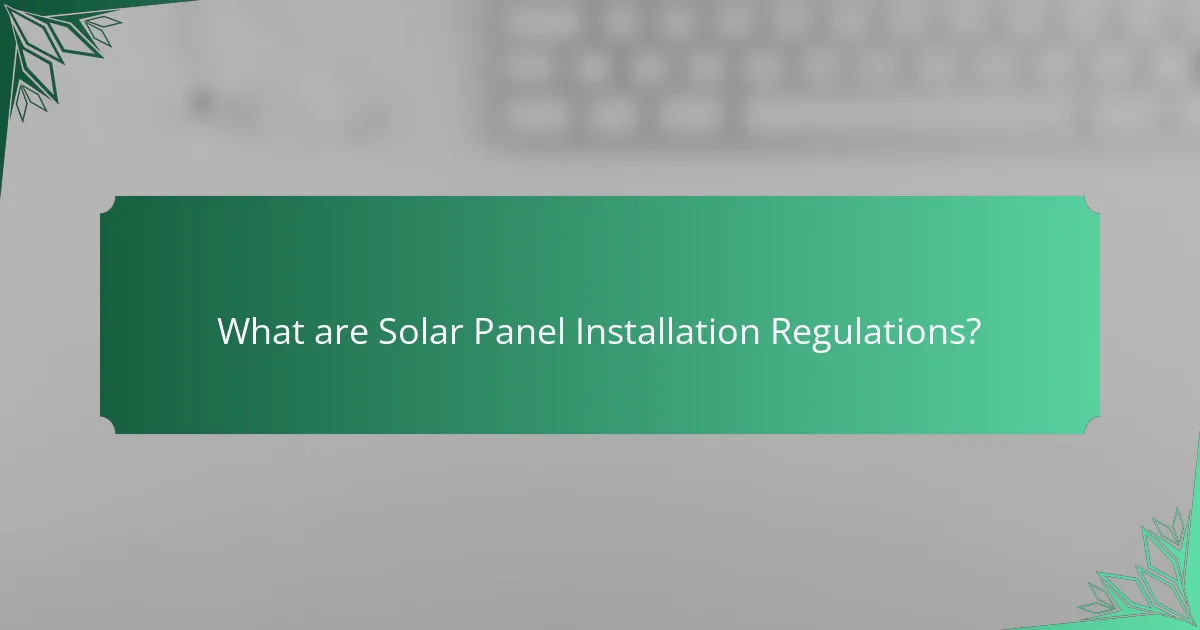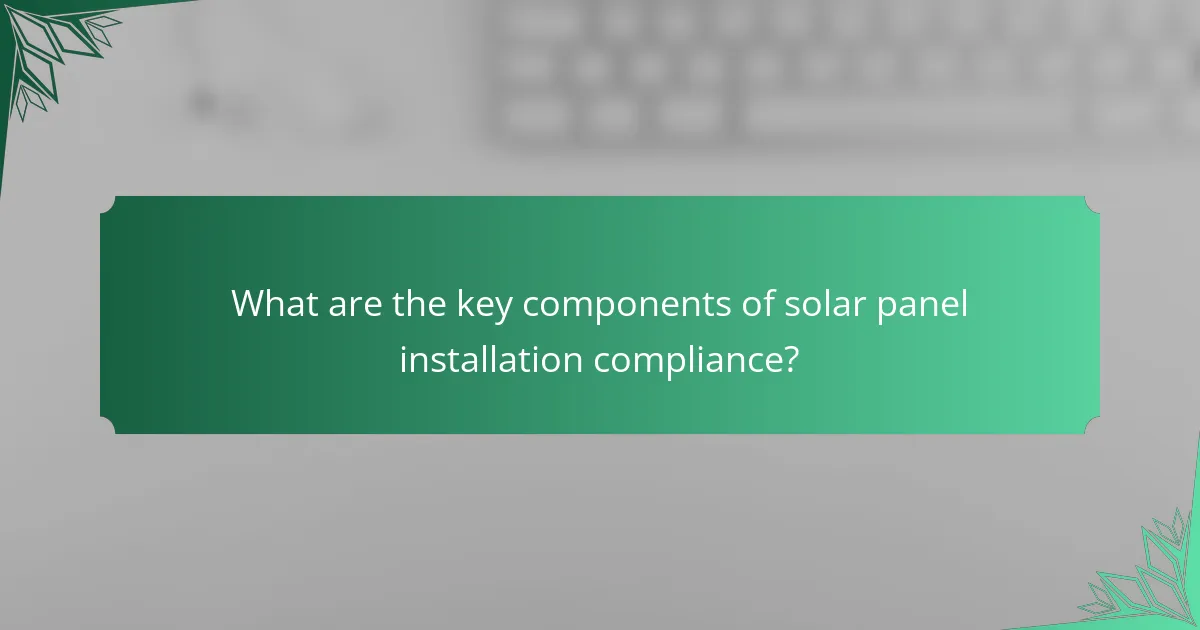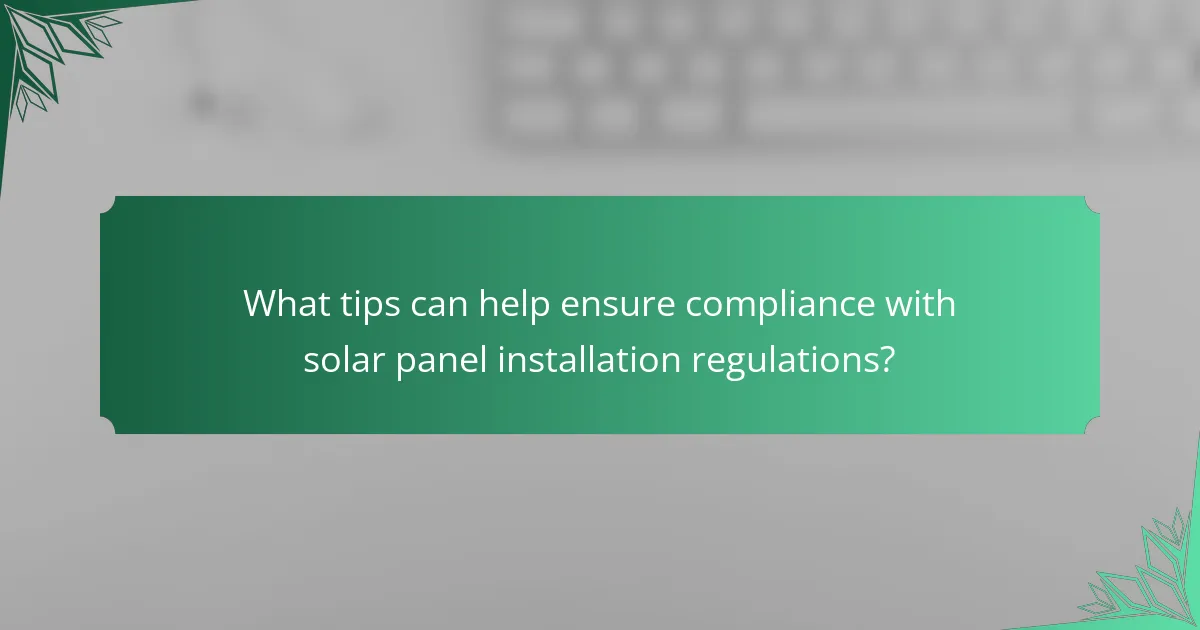
What are Solar Panel Installation Regulations?
Solar panel installation regulations are rules governing the installation of solar energy systems. These regulations vary by location and may include building codes, zoning laws, and electrical codes. Local authorities often require permits before installation begins. Compliance with safety standards is essential to ensure the system operates safely. Additionally, some regions have incentives or rebates that may influence installation practices. Regulations may also dictate the placement and size of solar panels on residential or commercial buildings. Understanding these regulations helps installers and homeowners avoid penalties and ensure proper system function.
How do local codes influence solar panel installation?
Local codes significantly influence solar panel installation by dictating specific requirements and standards. These codes can include zoning laws, building permits, and safety regulations. Compliance with local codes ensures that installations meet safety and performance standards. For instance, some areas may require structural assessments to support the weight of solar panels. Additionally, local codes may dictate the type of mounting systems allowed for solar installations. Failure to adhere to these codes can result in fines or removal of the solar system. Therefore, understanding local codes is crucial for successful and compliant solar panel installation.
What are common local codes related to solar panel installations?
Common local codes related to solar panel installations include building codes, electrical codes, and zoning regulations. Building codes ensure structural integrity and safety of the installation. Electrical codes govern the safe installation of electrical components. Zoning regulations determine where solar panels can be installed on a property. Many areas require permits before installation. Some regions have specific setback requirements from property lines. Local fire codes may also dictate access to rooftops for emergency services. Compliance with these codes is essential to avoid fines and ensure safety.
How can homeowners find their local solar installation codes?
Homeowners can find their local solar installation codes by checking with their local building department. These departments maintain updated codes and regulations regarding solar panel installations. Homeowners can also visit their city or county’s official website for resources and guidelines. Many municipalities provide specific documentation related to solar energy systems. Additionally, homeowners may consult with licensed solar installers who are familiar with local codes. These professionals often have insights into compliance requirements. Local utility companies can also offer information on solar installation regulations. They may provide resources or contacts for further assistance.
Why is compliance with regulations important for solar panel installation?
Compliance with regulations is crucial for solar panel installation to ensure safety and efficiency. Regulations help protect the environment by ensuring proper waste management and energy use. They also ensure that installations meet safety standards, reducing the risk of accidents. Compliance can lead to financial incentives, such as tax credits and rebates. Many jurisdictions require permits and inspections to verify compliance, which can prevent costly legal issues. Additionally, adhering to regulations fosters public trust in solar technology. Overall, compliance is essential for the successful integration of solar energy systems into existing infrastructures.
What are the potential consequences of non-compliance?
The potential consequences of non-compliance with solar panel installation regulations include legal penalties and financial losses. Non-compliance can result in fines imposed by local authorities. These fines can vary significantly based on jurisdiction and severity of the violation. Additionally, failure to adhere to regulations may lead to the revocation of permits. This can halt the installation process and incur further costs. Non-compliance can also affect insurance coverage for the installation. Insurers may deny claims related to non-compliant systems. Furthermore, non-compliance can lead to safety hazards, risking damage to property or injury. This can result in liability claims against the installer or property owner. Overall, adhering to regulations is crucial to avoid these serious consequences.
How does compliance benefit homeowners and installers?
Compliance benefits homeowners and installers by ensuring safety and efficiency in solar panel installations. It helps homeowners avoid potential legal issues and fines associated with non-compliance. For installers, adherence to regulations enhances their credibility and reputation in the market. Compliance also promotes energy efficiency, leading to long-term cost savings for homeowners. Furthermore, it can facilitate access to incentives and rebates offered by local governments. Studies show that compliant installations result in fewer accidents and lower insurance costs. Overall, compliance fosters a trustworthy relationship between homeowners and installers, ensuring quality workmanship and reliable performance.

What are the key components of solar panel installation compliance?
The key components of solar panel installation compliance include adherence to local building codes, electrical codes, and zoning regulations. Local building codes dictate structural integrity and safety standards for installations. Electrical codes ensure safe electrical practices and proper wiring. Zoning regulations may restrict installation locations based on land use. Permitting processes are also essential for legal compliance, requiring applications and inspections. Additionally, compliance with safety standards, such as those set by the National Electrical Code (NEC), is crucial. Following these components ensures that solar panel installations are safe, legal, and efficient.
How do permits and inspections fit into solar panel installation?
Permits and inspections are essential for solar panel installation. They ensure that the installation complies with local building codes and safety standards. Before installation, homeowners must obtain the necessary permits from local authorities. These permits typically require detailed plans and specifications of the solar system.
Inspections occur at various stages of the installation process. They verify that the work meets regulatory requirements. Inspectors check for proper electrical connections, structural integrity, and overall safety. Failure to secure permits or pass inspections can lead to fines or required removal of the system.
In many areas, the permitting process can take several weeks. This timeframe emphasizes the importance of planning ahead. Ensuring compliance protects the homeowner and enhances the system’s performance and longevity.
What types of permits are typically required for solar installations?
Solar installations typically require building permits, electrical permits, and sometimes zoning permits. Building permits ensure that the installation complies with local construction codes. Electrical permits are necessary for connecting the solar system to the electrical grid. Zoning permits may be needed depending on local regulations regarding land use. Specific requirements can vary by location, so checking with local authorities is essential. This ensures compliance with all applicable laws and regulations.
What is the inspection process like for solar panel installations?
The inspection process for solar panel installations involves multiple steps to ensure compliance with local regulations. First, the installation must be inspected by a qualified professional. This typically includes checking the structural integrity of the mounting system. Inspectors verify that electrical connections meet safety standards. They also assess the placement of panels for optimal sunlight exposure. Additionally, local building codes must be adhered to during the installation. After the initial inspection, a final inspection is conducted to confirm everything is installed correctly. Many jurisdictions require permits before installation begins. This process helps ensure safety and efficiency in solar energy systems.
What safety standards must be met during solar panel installation?
Safety standards during solar panel installation include adherence to the National Electrical Code (NEC) and Occupational Safety and Health Administration (OSHA) regulations. The NEC outlines electrical safety requirements to prevent hazards. OSHA sets standards for worker safety, including proper fall protection and personal protective equipment (PPE). Installers must ensure proper grounding and bonding of the solar system. They must also follow local building codes for structural integrity. Compliance with these standards minimizes risks associated with electrical shock and falls. These regulations are essential for safe installation practices in the solar industry.
What are the electrical safety requirements for solar panel systems?
Electrical safety requirements for solar panel systems include compliance with local electrical codes and standards. Systems must be installed by qualified professionals who understand the National Electrical Code (NEC). Proper grounding and bonding of all components is essential to prevent electrical shock. Circuit breakers and fuses should be used to protect against overloads and short circuits. Wiring must be rated for the system’s voltage and current. Additionally, equipment must be certified by recognized testing laboratories, such as Underwriters Laboratories (UL). Regular inspections and maintenance are necessary to ensure ongoing safety and compliance. These requirements help mitigate risks associated with electrical hazards in solar installations.
How do structural safety codes affect solar panel installation?
Structural safety codes influence solar panel installation by establishing requirements for building integrity. These codes ensure that the structures can support the weight and wind loads associated with solar panels. Compliance with these codes is mandatory for obtaining necessary permits. Local building authorities enforce these codes during inspections. Non-compliance can lead to penalties or installation delays. Specific codes may vary by region, reflecting local environmental conditions. For example, areas prone to high winds may have stricter requirements. Adhering to safety codes protects both the installation and the occupants of the building.

What tips can help ensure compliance with solar panel installation regulations?
To ensure compliance with solar panel installation regulations, follow local codes and guidelines. Research your local regulations thoroughly before starting the installation process. Obtain necessary permits from local authorities to avoid fines. Hire certified professionals for installation to meet safety standards. Regularly check for updates to regulations, as they may change over time. Document all installation processes and inspections for future reference. Engage with local solar energy associations for support and resources. These steps help ensure adherence to regulations and promote a successful installation.
How can homeowners prepare for the installation process?
Homeowners can prepare for the solar panel installation process by conducting thorough research and ensuring compliance with local regulations. They should first check local building codes and zoning laws to understand any specific requirements for solar installations. Homeowners must also obtain necessary permits before starting the installation.
Additionally, it is essential to choose a qualified installer who is familiar with local regulations. Homeowners should gather all relevant documentation, including property deeds and any existing utility agreements. Clearing the installation area of any obstacles will facilitate a smoother process.
Lastly, homeowners should communicate with neighbors about the installation to address any concerns. This preparation helps ensure compliance and a successful installation.
What documentation should be gathered before installation?
Before installation, the following documentation should be gathered: building permits, site plans, and electrical permits. Building permits ensure compliance with local construction regulations. Site plans provide an overview of the installation area and layout. Electrical permits confirm adherence to electrical codes and safety standards. Additionally, interconnection agreements with utility companies may be required. These documents facilitate a smooth installation process and ensure regulatory compliance. Proper documentation helps avoid delays and potential legal issues during the installation of solar panels.
How can homeowners work effectively with contractors to ensure compliance?
Homeowners can work effectively with contractors to ensure compliance by establishing clear communication from the start. This includes discussing project specifications, local codes, and regulations. Homeowners should provide contractors with all necessary documentation related to permits and inspections. Regular check-ins during the project help address any compliance issues promptly.
Additionally, homeowners should verify that contractors hold the required licenses and certifications. Research indicates that projects with clear guidelines and regular oversight have a higher compliance rate. A study by the National Renewable Energy Laboratory found that proper communication reduces errors in solar panel installations. Homeowners should also document all agreements and changes in writing to maintain accountability.
What are some common challenges in meeting solar panel installation regulations?
Common challenges in meeting solar panel installation regulations include navigating complex local codes. Each jurisdiction may have different requirements for permits and inspections. Compliance with safety standards is also critical. Installers must ensure that systems meet electrical and structural codes. Understanding zoning laws can be difficult. Some areas have restrictions on where panels can be installed. Additionally, obtaining approval from homeowners’ associations can pose challenges. Delays in the permitting process can impact project timelines. These factors can complicate the installation and increase costs for solar projects.
How can homeowners overcome zoning restrictions?
Homeowners can overcome zoning restrictions by applying for variances or special permits. A variance allows deviations from zoning laws under specific circumstances. Homeowners should gather necessary documentation, including site plans and justifications for the request. They may need to demonstrate how the solar installation aligns with community standards. Engaging with local zoning boards or planning commissions can facilitate the process. Homeowners should also consider appealing decisions if their initial requests are denied. Researching local zoning laws can reveal potential loopholes or exemptions. For instance, some jurisdictions allow solar installations under certain conditions regardless of zoning restrictions.
What resources are available for navigating complex regulations?
Government websites provide essential resources for navigating complex regulations. These sites often include guidelines, requirements, and updates on local codes. Industry associations offer valuable insights and best practices for compliance. Online forums and communities can facilitate discussions and share experiences among professionals. Legal consultants specialize in regulatory compliance and can provide tailored advice. Educational webinars and workshops enhance understanding of specific regulations. Local utility companies may offer resources related to incentives and compliance requirements. Finally, comprehensive guides and publications from reputable sources can serve as reference materials for installers.
Solar panel installation regulations encompass the rules governing the installation of solar energy systems, including building codes, zoning laws, and electrical codes that vary by location. Compliance with these regulations is crucial for ensuring safety, efficiency, and legal adherence, as it can prevent fines and enhance system performance. Homeowners can find local codes by consulting building departments and licensed solar installers, while understanding the permitting and inspection processes is essential for successful installations. The article also highlights common challenges in meeting regulations and provides tips for homeowners to navigate these complexities effectively.